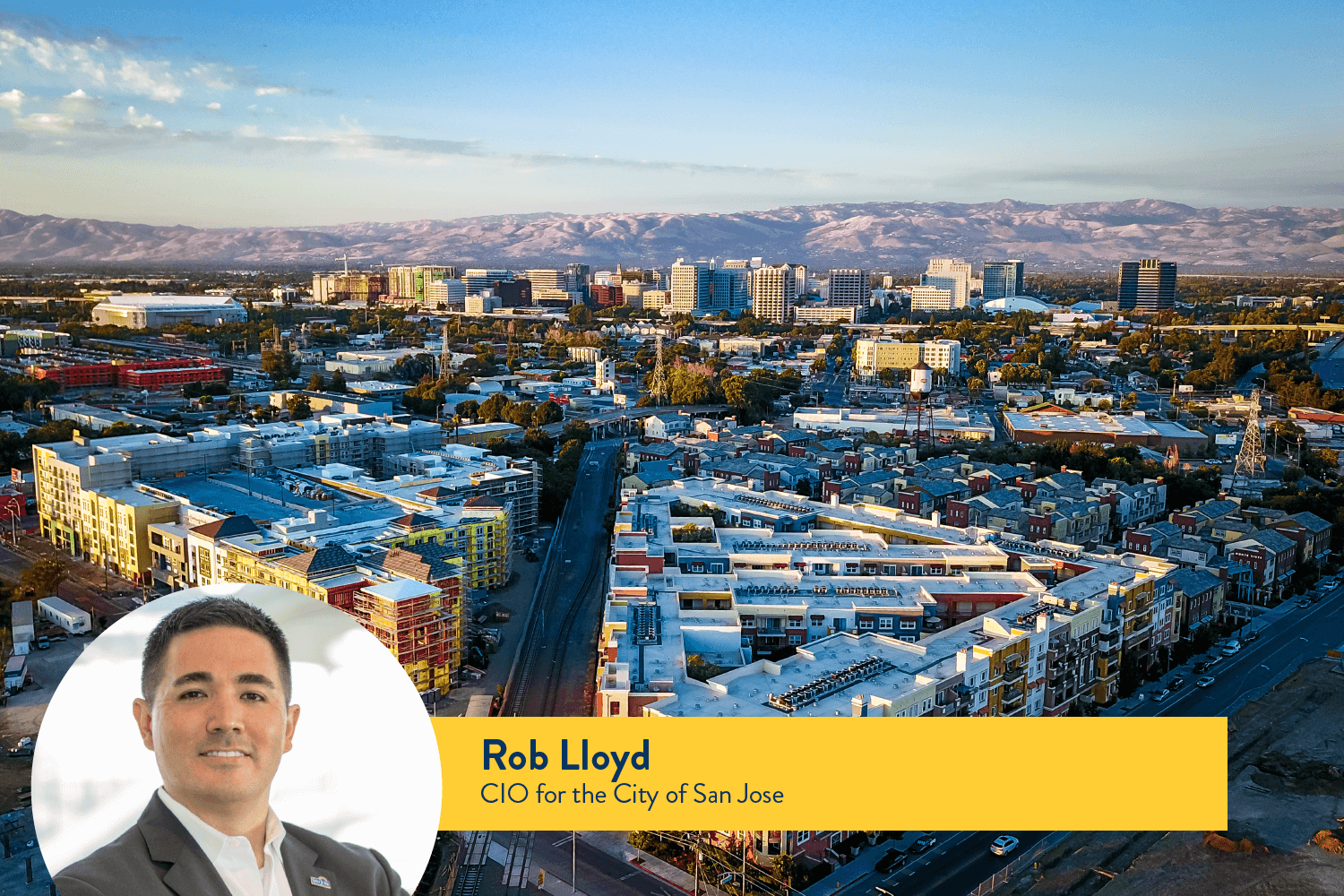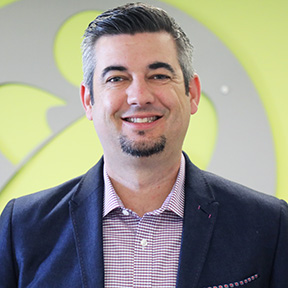
Rob Lloyd, CIO, City of San Jose
On this episode of The 3rd Question we talk with Rob Lloyd, CIO for the City of San Jose as he talks about being a bedroom city, effective execution and "how to do a lot with a little."
Video Transcript
Ryan James:
Hello, and welcome to The Third Question, a video interview series with public sector thought leaders from around the country. My name is Ryan James, your host, and today we are lucky enough to be joined by Rob Lloyd. Rob is the CIO for the city of San Jose in California. Rob, thanks for joining us today. It's good to see you again.
Rob Lloyd:
Good to see you as well.
Ryan James:
So, before we get into our three questions, I guess I'd first ask if you could just give us a quick introduction of who you are, your role, your organization, some of your responsibilities there at San Jose.
Rob Lloyd:
Sure. So, I'm CIO for the city of San Jose, we're the 10th largest city in the country, the third largest in California, and probably the best way I can describe it as is we're a city A to Z. We have an airport and help 16 million people take off a year and land. And we have a zoo where we literally feed a red Panda every day. So we do kind of a conglomerate of public service.
Ryan James:
And how long have you been in the city?
Rob Lloyd:
Almost exactly four years now.
Ryan James:
Well, we're going to go through your three questions. That's the name of this series. So, the first one is, as the CIO for the city of San Jose, what would you say some of your priorities have been over the last year or so? And maybe even going forward in the next year? And then kind of the part B to that question is how has the current pandemic that we've been dealing with shifted maybe some of that focus?
Rob Lloyd:
Sure. So actually our focus has been on the conclusion of our IT strategic plan that we wrote for the 2017 through 2020 period. And that was encapsulating just into a couple of key strategic initiatives. We said we're going to be a secure city. We're going to retool and modernize our organization. We said that we're going to learn how to execute, and we're going to have a powered by people, truly engaged team. And all that came out from some history of the organization where we're the leanest big city in the country. And also the only city in the country that shrinks during the day. So, most cities during the day they breathe up because people come in work. For us, people actually get their services from the city and then leave during the day and actually spend their money when they go to work for Apple or Google or Facebook and neighboring cities. And so, that's one of the realities of San Jose is in some ways we're kind of a bedroom community, but we're also the heart of Silicon Valley. So, we try to be as innovative as the community we serve.
In terms of the focus areas and how they've shifted, that modernization and bringing up the basics imperative was to catch up some tech debt and to put the organization in a position where it could really innovate as a matter of form and function rather than as an exception. And we have a lot of layers to that where it's an engine rather than a specific person who drives it, or one imperative initiative that everyone's going to rally around. We wanted an engine here that would be able to innovate at the work level, at how we organize our work, and the big dramatic change that we have to do occasionally. And we were just at that inflection point where we're going to be that transformational technology organization.
From that three years heading into the next, what COVID has done, COVID-19 and the economic crisis has done, is it's reduced a lot of resistance barriers because we're going to have to make changes and we're going to have to have a new normal because the world dictates it. And really the name of our game now is to apply all the lessons we've learned, all the investments we've made, to this accelerant of a pandemic and economic downturn to make those, grand changes, those re-engineering of our processes, to go omnichannel to go public, to go remote workforce, to still be secure over the next really six to 12 months. And that's that window of opportunity.
Ryan James:
It is interesting, because I've had a few of these conversations now, and it does seem like the pandemic has pushed fast forward on a lot of initiatives. And you said it yourself. Removing those barriers. All right. So the second question is this. So what would you say some of the city's biggest challenges have been when it comes to maybe even your plan, your '17 to 2020 plan, when it comes to evolving, delivering, and implementing your IT strategies?
Rob Lloyd:
So I would say the technology is hard, but it's actually the easiest part, right? Re-engineering the human latency of an organization, those are actually the hard parts. And we're somewhat gifted in the city of San Jose that we have the Silicon Valley DNA and that people actually expect more expect faster and expect iteration and collaboration. So, we do have some real strengths and opportunities that are in our favor that way.
The resource constraints of the city of San Jose, like I said, we spend the same amount on operations as San Francisco spends on just their police. So, they're a smaller city, but the ratios are crazy different. And people often ask us how we accomplished so much with so little. I'll tell you two things that really shape it. Number one is the ability to brutally prioritize, because an organization has to be able to say, "This is what's important." The other part of what I would tell you is in addition to the brutal prioritization is the ability to manage your resources well. And so for us, there's a couple of metrics. A lot of our metrics in IT, there's only four, and they're all trust-based. But also that we inspire trust in the sense that when we invest in a project, we deliver it and deliver it within that scope and that schedule. And we actually have a fourth metric measure, which is business value. Did the people who suggested, who worked on it, who sponsored it, get the value that they were looking for? Because if not, you could manage it on scope and schedule and on budget, but you still miss the mark.
Ryan James:
Yeah.
Rob Lloyd:
And so, the appropriate use of resources, the trust that is going to be up and available, I'm going to be happy with the service that I get, it's going to hit the business marks that I need. That's where an IT department and a CIO really have to make hay, because those resource discussions and those rare investments are a product of relationships and truly powered by people. So, we do have to manage to that level of business acumen, not just be good to technologists.
Ryan James:
Right. Right. Okay. We're at the third question. And over my shoulder here, I've got a few different time machines, and today I'm going to pick for you the DeLorean.
Rob Lloyd:
The DeLorean!
Ryan James:
From Back to the Future. So, that's your chosen time machine today. So the question is this. If I gave you the DeLorean from Back to Future, and you could go back to any point in your current role, or maybe even in the IT world of public sector, what advice would you give yourself? Or what would you change on how you did things? And I guess most importantly, why?
Rob Lloyd:
So I'm going to probably give you more of a philosophical thing is I wouldn't, because the journey has been so valuable and fulfilling, and we did a lot of good in the moments that we were needing to. So, you don't want to mess with those things, right? Maybe you'd have the butterfly effect and you lose things. You do one thing better and you lost a lot of other great things, but you do have to own the journey, be authentic in the way we take it. But what I would tell you, Ryan, is I do wish ... There's very few technology bets that we made wrong. If I had understood earlier in my career how much the journeys are just human ones, if you team up with good people who know their stuff, who are great team players, and who are taking on big challenges, every major mark in my career where I look back with some pride that we did something special was always marked by just that one variable is that I got to work with great people. So, I would refuse your time machine because I don't want to ruin all the good things that we get to look back on.
Ryan James:
Appreciate you taking the time, just to answer the three questions. And if any of our viewers want to hear more from other thought leaders, you can subscribe at thethirdquestion.com, our website. This interview and others will be on there as we continue to release them over the weeks to come. So Rob, thank you for your time. I know how busy you are, and I appreciate you carving out a little bit of it for us today.

